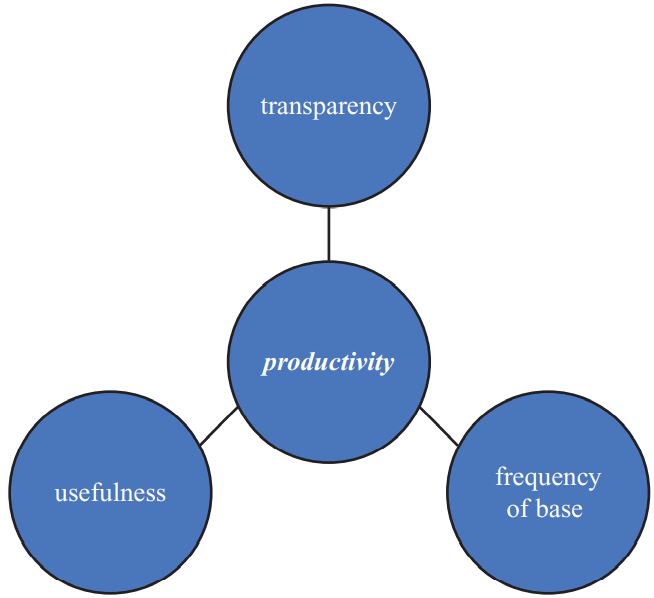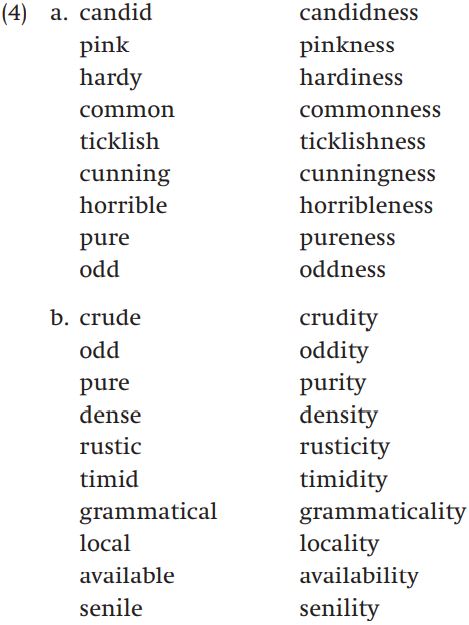


 Grammar
Grammar
 Tenses
Tenses
 Present
Present
 Past
Past
 Future
Future
 Parts Of Speech
Parts Of Speech
 Nouns
Nouns
 Verbs
Verbs
 Adverbs
Adverbs
 Adjectives
Adjectives
 Pronouns
Pronouns
 Pre Position
Pre Position
 Preposition by function
Preposition by function 
 Preposition by construction
Preposition by construction
 Conjunctions
Conjunctions
 Interjections
Interjections
 Grammar Rules
Grammar Rules
 Linguistics
Linguistics
 Semantics
Semantics
 Pragmatics
Pragmatics
 Reading Comprehension
Reading Comprehension|
Read More
Date: 2024-02-05
Date: 25-1-2022
Date: 2023-08-25
|
Factors contributing to productivity
A number of factors contribute to the degree to which we can use morphological processes to create new lexemes.

One factor is what is called transparency. Words formed with transparent processes can be easily segmented, such that there is a one-to-one correspondence between form and meaning. In other words, when we attach an affix to a base, the phonological form (the pronunciation) of both morphemes stays the same, and the meaning of the derived word is exactly what we would expect by adding the meaning of the affix to that of the base. Let’s look further at the case of -ness and -ity, this time considering the additional examples in (4):

In all the -ness examples in (4a), it is easy to divide the complex words into base and suffix. The base is always pronounced in the derived word as it is in isolation. And the suffix always creates a noun meaning ‘state of being “adjective”’, whatever the adjective. Words formed with -ness are perfectly transparent. The suffix -ity is somewhat less transparent. Although you don’t see this when words are written in English orthography, when you pronounce them, you see that -ity often has the effect of changing the phonological form of its base – sometimes its stress pattern, and sometimes both stress and phonological segments in the base. So timid in isolation is pronounced with stress on the first syllable (TImid), but when -ity is added, stress shifts to its second syllable (tiMIDity). And with the base rustic, in addition to a shift in stress from first to second syllable, the final [k] of the base becomes [s] when -ity is added. Further, some of the words formed with -ity have meanings that cannot be arrived at by combining the meaning of the base with that of the suffix. An oddity, for example, is not merely ‘the state of being odd’ (we would probably prefer the word oddness for that meaning), but a person or thing that is odd. And a locality is not ‘the state of being local’, but a place or area. Finally, consider the examples in (5):

In the first two examples, -ity occurs on bound bases ver, dexter. In the third, it’s not clear exactly how to analyze the derived word. Although it appears to be a combination of author and -ity, there are two problems with this analysis. First, as a free base author is a noun, and -ity typically attaches to adjectives, rather than nouns. And second, it’s not clear what the independent meaning of the base is; certainly the meaning ‘professional writer’ does not seem to be part of the meaning of authority. We never find -ness, however, on bound bases, nor do we find it on bases that are not adjectives. All of this adds up to a conclusion that the suffixation of -ness is a much more transparent process than the suffixation of -ity, and this in turn suggests that -ness is a more productive affix than -ity.
Hand in hand with the notion of transparency comes the related notion of lexicalization. When derived words take on meanings that are not transparent – that cannot be made up of the sum of their parts – we say that the meaning of the word has become lexicalized. Meanings of complex words that are predictable as the sum of their parts are said to be compositional. Lexicalized words have meanings that are non-compositional. So the words oddity and locality that we looked at above have developed lexicalized or non-compositional meanings. Sometimes the meanings of derived words have drifted so far from their compositional meanings that it’s quite difficult to imagine the compositional meaning for them. Consider, for example, the word transmission, which denotes a part of a car. It takes a bit of thought to realize that the car part in question is so-called because it transmits power from the engine to the wheels.
Transparency is not the only factor that contributes to productivity. Another factor that is important is what we might call frequency of base type. By this, I mean the number of different bases that might be available for affixes to attach to, thus resulting in new words. If an affix attaches only to a limited range of bases, it has less possibility of giving rise to lots of new words, and it will therefore be less productive. Consider, for example, the suffix -esque in English, which means something like ‘having the style of ’ (Marchand 1969: 286). It attaches to nouns, but mostly to concrete ones (statuesque), and in fact, most often to proper names (Kafkaesque, Reaganesque). Indeed, although it attaches pretty freely to names, it seems most comfortable on names that have at least two syllables (?Bushesque, ?Blairesque). Compared to a suffix that could attach to any noun at all, -esque would be less productive.
The final factor that contributes to productivity is what we might call usefulness. A process of lexeme formation is useful to the extent that speakers of a language need new words of a particular sort. It’s always useful, for example, to be able to form a noun meaning ‘the state of being X’ from an adjective, whatever X means, so both -ness and -ity are highly useful affixes. On the other hand, consider the suffix -ess in English. It used to be useful to be able to coin words referring to jobs performed by women or positions held by women (stewardess, murderess, authoress). But with the rise of feminism and efforts to promote gender-neutral language, such words have fallen into disuse, and the need for new words using this suffix has almost died out. Consequently the affix has become far less productive, perhaps completely unproductive.
|
|
|
|
إدارة الغذاء والدواء الأميركية تقرّ عقارا جديدا للألزهايمر
|
|
|
|
|
|
|
شراء وقود الطائرات المستدام.. "الدفع" من جيب المسافر
|
|
|
|
|
|
|
العتبة العبّاسيّة: البحوث الّتي نوقشت في أسبوع الإمامة استطاعت أن تثري المشهد الثّقافي
|
|
|